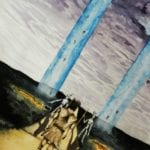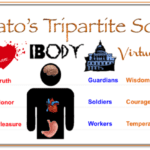Aristotle’s Nicomachean Ethics Book II
In this book, Aristotle sets out to define virtue. Complete definitions consist of a genus (matter), specific difference (form), agent, and end. He establishes the genus as hexis (disposition) by first considering the various principles in the soul, the specific difference as “rendering its subject good,” final cause as “by performing his function well,” and agent cause as “lying in the mean between excess and defect as the prudent man would determine it.” The argumentation for each is as follows.
Chapter 1 – What causes virtue (quality)?
Habit is not in us by nature.
The moral virtues are not a natural property.
People learn to do good acts by good legislation.
Moral dispositions are formed from corresponding actions.
We need to control what we do in order to control the character of our actions.
Virtue is not a property, it is a quality.
If we want to act well, we should incline ourselves toward that by repeating good actions.
Intellectual virtue is caused by teaching, and moral virtue is caused by habit. Moral virtues not caused by nature because things that come from nature do not’s very buy custom Open to go up, Clearly people can be trained to have different tastes.) Nature merely gives the power to act and virtue follows just as it does with Art. That’s why legislators should care about habits
By performing virtuous actions because we become disposed toward those actions, so we need to control what we do.
Chapter 2 – Since actions cause habits, and since we can control what we do, what actions are good?
Habituation causes virtue because it trains us to hit the mean between excess and defect and doing it over and over causes virtue.
Since all qualities are destroyed by excess and defect, and since you become stronger by just strong enough (mean), virtue is in the actions by which it was created.
Chapter 3 – Since the mean isn’t always obvious, what helps us measure the excess/defect vs. mean?
Pleasure and pain (emotions)
Chapter 4 – Is it sufficient to hit the mean by accident or as an artist would?
Since art and chance’s goods are only in the product, but virtue’s good is in the qualification of the person as principle creating the “product,” then the principle must be fully engaged as a person with: 1) knowledge; 2) deliberation; 3) for its own sake; 4) from a stable disposition (potential)
Chapter 5 – Since we have considered emotions, powers, and habit, What is the genus/matter of virtue?
Virtue is not a passion because passions are not excellent or base, praised or blamed, nor do we choose them. They moved us rather van we moving them. Virtue is not a capacity for the same reason, we develop capacities.
Since people are not praised for abilities, or for how they feel, virtue is materially a stable habit to hit the mean.
Chapter 6 – What species/formal cause of habit?
Virtue perfects both the action and the the agent-In accord with a mean. A mean can be in itself like eight is in between six and 10, or there is a mean relative to us whereby we select the amount of food that is appropriate to our size. Habits are defined by their acts and moral virtues through a choice or decision. Action is defined by the object which is the mean relative to us. Not every act admits of a mean, Like committing murder. There is no moderate amount of murder that is acceptable.
Since excellence both makes the thing itself good (matter) and makes it perform its function well (form), virtue is a habit of choosing the relative mean in actions and emotions.
Chapter 7 – What are examples of excess and defect?
Courage – foolhardiness and cowardice etc.
Chapter 8 – How are vices opposed to virtues?
Contraries include both actions and emotions. Sometimes the excess is more opposed to the mean and sometimes the defect is more opposed to the mean (rashness seems more like courage than cowardice).




